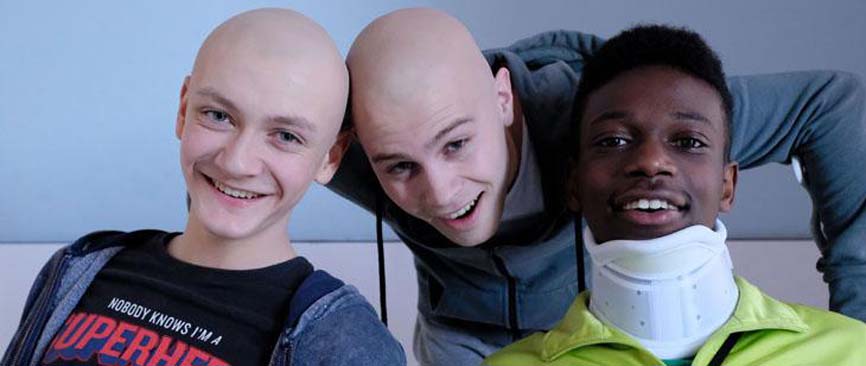
Red Band Club: Interview
Interview with Albert ESPINOSA
Author of Red Band Club
Published by Sophie Ricaume January 16, 2018
"The heroes don't wear capes, they wear red wristbands."
At the age of 44, Albert Espinosa has come a long way. He has bounced back, armed with humor and indestructible positivity. Author of the original Spanish version of Red Band Club, Polseres Vermelles, he has survived three cancers and lived in hospitals for years, among "his own." A look back at the birth of this sweet but unmelodramatic series, truly one of kind, which is devoted to the patient experience… finally!
How much of Red Band Club is fiction, and how much is real?
The story is autobiographical, based on my book Le Monde Soleil, published by Livre de Poche (The Yellow World). The series Red Band Club tells the story of my life between the ages of 14 and 24. During those ten years, even though I lost a leg, a lung and half my liver, I was always happy. This fiction isn't really about cancer for me - it talks about what I learned from the disease, day after day.
What message were you trying to get across when you wrote Red Band Club?
First of all, that dying is not sad. What's sad is not living life to the fullest. After that, I wanted to convey the idea that every loss is a gain.
Is humor the best ammunition to face life?
I always say that humor helps everything. I've always been convinced that the best jokes are the ones based on reality. For example, I had a hydraulic prosthetic leg that used to leak. One day in the street, a lady said to me, "You're leaking oil, sir." And it was true. A stream of oil was leaking out of my prosthetic leg. With my new electric leg, I have other problems, because I have to charge it at night. In hotel rooms with only one plug, I have to decide whether to charge my computer, my cell phone or my orthopedic leg.
We're used to seeing a lot of hospital series on TV where the heroes are doctors, but not so many about patients. Was it important to give them that recognition?
Yes. My greatest reward after the series aired was to hear viewers say that the heroes don't wear capes, they wear red wristbands. It changed the way they look at sick people. In every country that has adapted the series, hospital visits went up 40%. It's important to visit cancer patients and give them love. In the hospital, people don't die of cancer alone; they die of boredom, too.
In the series, there are two different worlds: outside the hospital and inside the hospital. Do the patients create a new family for themselves?
At the hospital, we made a pact with life. For every one of our friends who died there, we divided his or her life into equal parts, so that it could continue to thrive within us. That way, we could fulfill the dreams they could never attain. During the ten years I spent in the hospital, I gained 3.7 redistributed lives. Added to my own, that makes 4.7. They all grew within me, and those 4.7 lives wanted me to tell this story.
How was the story received in Spain? Do you think the international adaptations are faithful to the original work?
It was all amazing. In Spain, it was a success, just like in Germany, Italy, Argentina, Chili and Russia. Even Spielberg has made an adaptation of Red Band Club. There have been fourteen versions to date. But I think there's something special about the French version. The authors did a really great adaptation. The director Nicolas Cuche is a genius and the actors are one-of-a-kind. I love this version and I think it's one of the best.
Have you fulfilled all your dreams?
I've always thought that if you believe in your dreams, they end up coming true. Today I am alive, even though I only had a 3% chance of survival. I never imagined one day I would make it from the bed of my little hospital room onto my TV screen. It's a real dream come true!
READ MORE: Red Band Club










